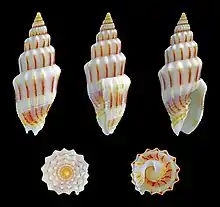| Vexillum exasperatum | |
|---|---|
 | |
| Vexillum (Costellaria) exasperatum | |
| Scientific classification | |
| Domain: | Eukaryota |
| Kingdom: | Animalia |
| Phylum: | Mollusca |
| Class: | Gastropoda |
| Subclass: | Caenogastropoda |
| Order: | Neogastropoda |
| Family: | Costellariidae |
| Genus: | Vexillum |
| Species: | V. exasperatum |
| Binomial name | |
| Vexillum exasperatum (Gmelin, 1791) | |
| Synonyms[1] | |
| |
Vexillum exasperatum, common name : the roughened mitre, is a species of small sea snail, marine gastropod mollusk in the family Costellariidae, the ribbed miters.[1]
This species is sometimes spelled as Vexillum exasperata [2]
Description
The shell size varies between 10 mm and 29 mm
(Described as Mitra (Costellaria) exasperata var. hadfieldi) The shell is turreted with a high spire. It contains seven whorls. The shell is eight or nine ribbed, differing from the type in being dark-brown, banded at the line of the sutures of the upper whorls, and also twice transversely banded at the body whorl. The outer lip shows nodulose striae. The columella has four plaits. Occasionally specimens occur wholly suffused with dark-brown. [3]
Distribution
This species occurs in the Red Sea, in the Indian Ocean off Chagos Atoll, Madagascar, the Mascarene Basin and Tanzania, and in the Pacific Ocean off the Philippines, Fiji, New Caledonia and the Solomons Islands; also off Austrakia (Northern Territory, Queensland).
References
- 1 2 Vexillum (Costellaria) exasperatum (Gmelin, 1791). Retrieved through: World Register of Marine Species on 6 December 2010.
- ↑ Drivas, J. & M. Jay (1988). Coquillages de La Réunion et de l'île Maurice
- ↑ Melvill, J. C. & Standen, R. (1895). Notes on a collection of shells from Lifu and Uvea, Loyalty Islands, formed by the Rev. James and Mrs. Hadfield, with list of species. Journal of Conchology. 8: 84–132, 3 pls
- Wood, W. 1828. Index Testaceologicus; or A Catalogue of Shells, British and Foreign, arranged according to the Linnean system. London : Taylor Supplement, pp. 1-59, pls 1-8.
- Hervier, J. 1897. Descriptions d'espèces nouvelles de Mollusques provenant de l'Archipel de la Nouvelle Calédonie. Journal de Conchyliologie 45: 47-69, pls 2-3
- Odhner, N.H.J. (1919). Contribution a la faune malacologique de Madagascar. Arkiv For Zoologi, K. Svenska Vetenskapsakademien 12(6). 52 pp, 4 pl.
- Dautzenberg, Ph. (1929). Mollusqués testaces marins de Madagascar. Faune des Colonies Francaises, Tome III
- Iredale, T. 1929. Queensland molluscan notes, No. 1. Memoirs of the Queensland Museum 9(3): 261–297, pls 30–31
- Spry, J.F. (1961). The sea shells of Dar es Salaam: Gastropods. Tanganyika Notes and Records 56
- Drivas, J. & M. Jay (1988). Coquillages de La Réunion et de l'île Maurice
- Turner H. 2001. Katalog der Familie Costellariidae Macdonald, 1860. Conchbooks. 1–100 page(s): 16
- Steyn, D. G.; Lussi, M. (2005). Offshore Shells of Southern Africa: A pictorial guide to more than 750 Gastropods. Published by the authors. pp. i–vi, 1–289.
External links
- "Vexillum (Costellaria) exasperatum". Gastropods.com. Retrieved 6 December 2010.
- Liénard, Élizé. Catalogue de la faune malacologique de l'île Maurice et de ses dépendances comprenant les îles Seychelles, le groupe de Chagos composé de Diego-Garcia, Six-îles, Pèros-Banhos, Salomon, etc., l'île Rodrigues, l'île de Cargados ou Saint-Brandon. J. Tremblay, 1877.
- Cernohorsky, Walter Oliver. The Mitridae of Fiji; The veliger vol. 8 (1965)
- Gmelin, J. F. (1791). Vermes. In: Gmelin J.F. (Ed.) Caroli a Linnaei Systema Naturae per Regna Tria Naturae, Ed. 13. Tome 1(6). G.E. Beer, Lipsiae
- Lamarck (J.B.M.de). (1811). Suite de la détermination des espèces de Mollusques testacés. Mitre (Mitra.). Annales du Muséum National d'Histoire Naturelle. 17: 195-222